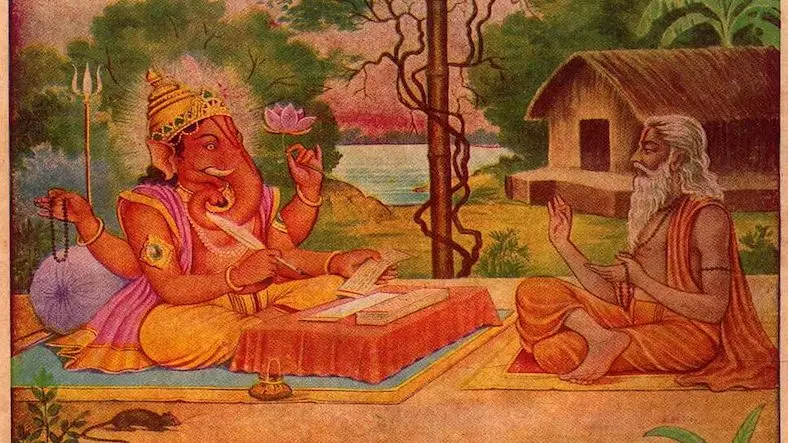The Vedas are a collection of ancient religious texts that hold great significance in Hinduism. They are considered the oldest sacred scriptures of Hinduism and are believed to have been composed between 1500 BCE and 500 BCE, although their oral traditions are even older.
The word "Veda" is derived from the Sanskrit root "vid," which means "knowledge" or "wisdom." The Vedas are considered to be revelations or "shruti" (that which is heard) by seers or sages known as "rishis." These texts are regarded as divine knowledge and are considered the ultimate authority in Hinduism.
Indeed, the four Vedas are considered the heart of Hinduism and form the foundational texts of this ancient religion. They are revered as sacred scriptures and are considered the ultimate authority in matters of religious, philosophical and ritualistic practices. Let's explore each of the four Vedas and their significance:
- Rigveda: The Rigveda is the oldest and most prominent Veda. It consists of a collection of hymns, prayers and invocations addressed to various deities. These hymns are attributed to different sages or rishis and are dedicated to gods such as Agni (the god of fire), Indra (the god of thunder and war) and Varuna (the god of cosmic order). The Rigveda also contains philosophical and metaphysical insights, as well as descriptions of rituals and societal norms.
- Samaveda: The Samaveda is derived from the Rigveda and focuses on the musical aspect of the hymns. It is a collection of melodies and chants that were sung during rituals and sacrifices. The hymns of the Samaveda are characterized by their poetic and melodic structure and they serve as a guide for priests who perform Vedic rituals.
- Yajurveda: The Yajurveda provides instructions and guidelines for performing rituals and sacrifices. It contains prose formulas, called yajus, which are recited by the priests during ceremonies. The Yajurveda is divided into two main branches: the Krishna Yajurveda and the Shukla Yajurveda. The former focuses more on the rituals and the actions to be performed, while the latter includes both the rituals and their philosophical explanations.
- Atharvaveda: The Atharvaveda is a collection of hymns, spells and incantations. It covers a wide range of topics, including healing, protection against evil spirits, prosperity and social and domestic life. The Atharvaveda reflects a more folkloric and practical aspect of Vedic traditions, dealing with everyday concerns and rituals related to household matters.
Together, the four Vedas provide a comprehensive understanding of the ancient Indian religious, philosophical and cultural traditions. They are regarded as divine revelations and serve as the basis for Hindu rituals, spiritual practices and moral principles. The Vedas continue to be studied, chanted and revered by scholars, priests and individuals seeking spiritual guidance and insight into the deep wisdom contained within these ancient texts.
The Vedas serve several purposes and hold deep significance in Hinduism and Indian culture. Here are some reasons why the Vedas are important:
Google Ad 1
- Religious and spiritual guidance: The Vedas are considered divine revelations and are regarded as the ultimate authority in Hinduism. They provide guidance on various aspects of religious and spiritual life, including rituals, prayers, moral principles and philosophical insights. They offer a framework for understanding the nature of the divine, the cosmos and the individual's relationship with the universe.
- Preservation of ancient knowledge: The Vedas are among the oldest extant religious texts in the world. They have preserved ancient wisdom, traditions and cultural practices that date back thousands of years. They provide a link to the rich cultural heritage and intellectual traditions of ancient India.
- Ritual and ceremonial practices: The Vedas contain detailed instructions for performing rituals, sacrifices and ceremonies. They guide priests and practitioners in carrying out various religious and ceremonial practices with precision and authenticity. The rituals described in the Vedas play a significant role in Hindu worship and are believed to have spiritual and cosmic significance.
- Source of philosophical and metaphysical insights: The Vedas delve into profound philosophical and metaphysical concepts. They explore questions about the nature of reality, the purpose of life, the existence of the soul and the interconnectedness of all beings. The Upanishads, which are part of the Vedic corpus, particularly delve into these philosophical inquiries and are considered the basis of Vedanta philosophy.
- Cultural and linguistic heritage: The Vedas are written in Sanskrit, an ancient and sacred language of India. They embody the linguistic and literary prowess of ancient Indian civilization. Studying and preserving the Vedas helps to maintain and appreciate the linguistic and cultural heritage of India.
- Continuity and reverence: The Vedas have been transmitted through oral tradition for centuries. The process of reciting and memorizing the Vedas has ensured their preservation and continuity over generations. The reverence for the Vedas has been deeply ingrained in Hindu society and continues to be passed down through rituals, teachings and religious practices.
Overall, the Vedas play a central role in shaping religious, philosophical and cultural aspects of Hinduism. They provide spiritual guidance, preserve ancient wisdom and contribute to the understanding and practice of Hindu rituals and ceremonies.
Thanks for reading the article, for more related articles read and subscribe to peoples blog articles.















